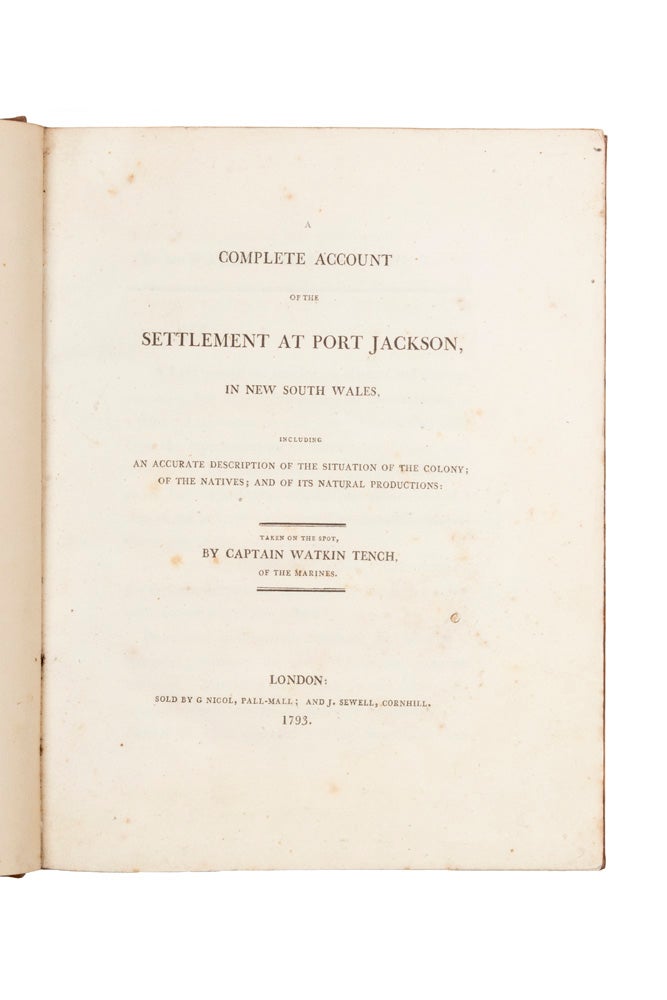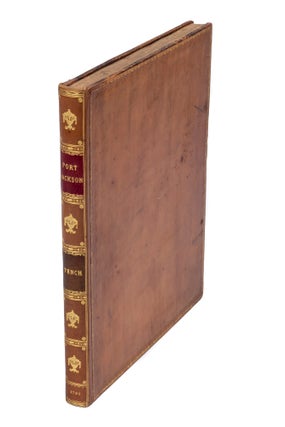A Complete Account of the Settlement at Port Jackson…
A Complete Account of the Settlement at Port Jackson, in New South Wales, including an Accurate Description of the Situation of the Colony; of the Natives; and of its Natural Productions: taken on the spot, by Captain Watkin Tench, of the Marines.
London: G. Nicol and J. Sewell, 1793.
Quarto, with a folding map; contemporary polished calf, spine renewed to style, gilt in panels with double labels.
Tench's second book, taking the story to 1791
Scarce first edition of one of the canonical First Fleet accounts, the second of Tench's two books, continuing his narrative to the end of the first four years of settlement in an 'accurate, well-written and acutely observed account of the earliest years of Australia's colonization' (Wantrup). Tench left New South Wales with the other marines on 18 December 1791 aboard HMS Gorgon which had accompanied the Third Fleet, and this book was published in November or December 1793, more than a year after his return.
Scarce first edition of one of the canonical First Fleet accounts, the second of Tench's two books, continuing his narrative to the end of the first four years of settlement in an 'accurate, well-written and acutely observed account of the earliest years of Australia's colonization' (Wantrup). Tench left New South Wales with the other marines on 18 December 1791 aboard HMS Gorgon which had accompanied the Third Fleet, and this book was published in November or December 1793, more than a year after his return.
Tench had explored the country around Sydney, discovered the Nepean River, and begun the assault on the still impregnable Blue Mountains. The fine folding engraved 'Map of the hitherto explored Country, Contiguous to Port Jackson: Laid down from Actual Survey', which prints the results of recent explorations, provides an excellent survey of known lands, detailing Botany Bay and Broken Bay along the coast and inland to the Nepean river, with numerous engraved notes on the landscape with a view to future farming and grazing ventures. 'Where the other First Fleet journalists described the excursions and expeditions of others, Tench published selections from the actual journals kept on his own expeditions. He was the first Australian explorer to do so. Tench and his travelling companion, William Dawes, have been described as the first systematic explorers, which gives an added point to his being the first to print extracts from his "Travelling Diaries in New South Wales"' (Wantrup).
Tench's well-crafted book paints a comprehensive view of daily life in the settlement through years of hardship and severe shortages. An understanding and intelligent observer of human nature, he gives vivid insights into the often strained relationships between convict labourers and the marines set to guard them. His account has been praised as the most insightful and detailed description of the social fabric of the penal colony, in contrast to other more formal and official narratives.
There is a detailed account of the First Nations people, and attempts to note their society and language, abundant "with vowels …mellifluous and sometimes sonorous", noting that Mrs Johnson, wife of the Chaplain, had named her daughter Milba, taken as she was with the indigenous name [pp 178-204]. Tench also describes his significant explorations of the landscape of the Sydney basin and forays into the Blue Mountains, while providing sympathetic descriptions of their contact with the Eora people.
A famous passage describes Bennelong's introduction of his wife Barangaroo, a Cadigal woman, to the white colonists in 1790. Tench was surprised to find 'that amidst a horde of roaming savages in the desert wastes of NSW, might be found as much feminine innocence, softness, and modesty (allowing for inevitable difference of education), as the most finished system could bestow'. She was however badly treated by the settlers: Phillip refused her wish to give birth to her child at the governor's house, in order to be near her country. She was forced to go to the hospital, where she died in childbirth. Despite Tench's sympathetic description of her, she is celebrated for her sometimes violent opposition to the colonists, and her strenuous objections to Bennelong's conciliatory approach. It is of course in her honour that the extensive development on the east side of Darling Harbour has been named.
Crittenden, 'A Bibliography of the First Fleet', 238; Ferguson, 171; not in the catalogue of the Hill collection; Wantrup, 16.
Condition Report: Tiny hole in title-page; the map a little spotted; otherwise fine. As often bound without the list of subscribers, only sometimes present.
Price (AUD): $16,850.00
US$11,004.08 Other currencies



